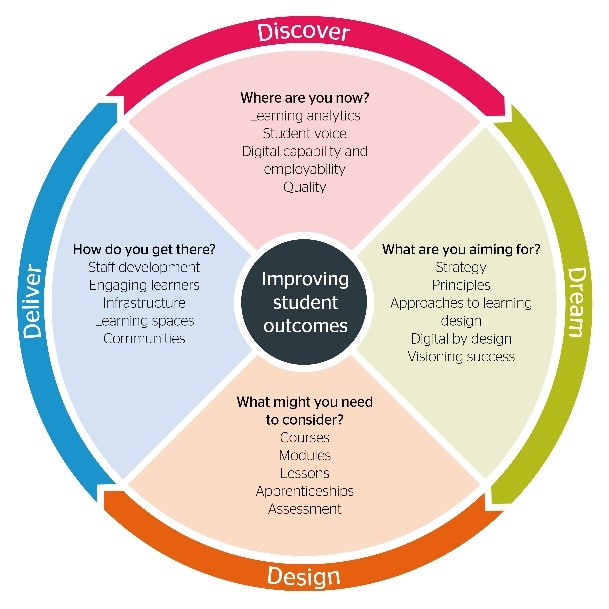Digital literacy will increasingly become an essential requisite of every graduate, and key to their employability. Sarah Knight shares with us examples of how the Student Experience Experts Group at JISC mobilises knowledge in this area, and how some universities are raising to the challenge of supporting students’ digital experience and learning.
One of the highlights of my role at Jisc as Head of change: student experience is to convene and host meetings of the Student experience experts group. I originally established this group in 2004 to support Jisc’s work in technology enhanced learning. The aims of this group are to consult with staff in higher and further education and skills on how we can better support their requirements and for them to act as champions for Jisc’s work. The group now has over 250 members across the UK and across sector and is a vibrant and active community of practice.
We ran the 41st meeting on this group in October 2017 and I have highlighted some of the innovative practice which was shared and discussed at this meeting.
Designing learning and assessment in a digital age
A key theme for the meeting was how we can best support staff and students in designing learning and assessment in a digital age. Jisc has worked with colleges and universities since 2006 on supporting staff with their learning and curriculum design. You can view our learning design family tree to discover the main outcomes from our past projects and their links to other key developments in learning and assessment design between 2006 and 2014. Gill Ferrell and Ros Smith shared an overview of their recent review of how learning and curriculum design practices have evolved and what key challenges still remain in this space.
Word cloud produced by the Student experience expert group on what makes an effective learning design (October 2017)
When designing learning in a digital environment, or supporting others in doing so, your journey has to start with a clear understanding where you are now, and what you want to happen. In order to justify any changes, or to build on current successes, you will need a reliable evidence base. Learning analytics is starting to offer institutions metrics, such as how students are using digital resources, which can also support a more accurate, data-informed approach to curriculum design https://www.jisc.ac.uk/guides/designing-learning-and-assessment-in-a-digital-age. Already, colleges and universities are using dashboards which provide see-at-a-glance evidence of resource usage and student engagement. This makes possible a more fluid, dynamic response to curriculum development. You can find out more about Jisc’s work on learning analytics here
One of the challenges we have identified, however, is how we support staff on using this data in a meaningful way to inform their designs. We are running an open workshop on the 20th March in Birmingham on data informed curriculum design. More information is available from our events page https://www.jisc.ac.uk/events/data-informed-blended-learning-design-workshop-20-mar-2018
Preparing students for a digital workplace
Another challenge which was discussed, is how we ensure students are prepared for a digital workplace. How does their course offer students opportunities for authentic learning which develops the skills and knowledge they need for their chosen profession or career? Through the Jisc Student digital experience tracker (2017), although 80% of HE learners feel that digital skills will be important in their chosen career, only 50% agree that their course prepares them well for the digital workplace.
“We need to be asking questions such as ‘What does it mean to be a nurse?’ Being a healthcare professional will mean something completely different in five years’ time. Increasingly nurses are becoming educators and showing people how to monitor their own health and respond to it.”
Helen Beetham, educational consultant
It is essential that staff have the confidence to be able to design in opportunities for students to develop their digital capabilities and skills so they are better prepared for the workplace. Through the Building digital capability project, Jisc is supporting staff and students with the development of their digital capabilities. We are collating case studies on how universities are developing their organisational approaches to digital capability and you can access these here.
We have also designed a one day course, Curriculum confidence: Designing for digital capabilities in the curriculum to support staff with their practice and you can read about the principles underpinning this course and view the materials we are using here.
Approaches to curriculum design
We are seeing institutions starting to take a holistic approach to supporting staff with their learning and curriculum design. With a recognition that learning happens everywhere, staff are changing the way they design their learning and making more effective use of face to face contact time with their students for collaborative problem solving activities rather than the delivery of content. We are starting to see universities implement these approaches across their provision for example, the University of Northampton are implementing active blending learning and in their newly built Waterside Campus there will be no large lecture theatres.
At Staffordshire University, academic staff are encouraged to focus design activities on courses rather than modules. Whereas previously there were no regular meetings between course teams, a new ‘connected university’ strategy is establishing a whole-team approach to learning design. At the same time, there has been a drive to embed technology fully into learning and teaching across the university. All academic staff have been issued with Surface Pro tablets and classroom refurbishment has contributed to a culture of digital-as-norm for teaching and learning.
The change has been supported by staff development for course leaders based on a combination of the Carpe Diem and CAIeRO approaches. Both use face-to-face workshops to facilitate dialogue and collaboration between team members.
“Nothing is really better than the opportunity to try things out in small face-to-face groups.” Sue Lee, e-learning manager, Staffordshire University
How is Jisc supporting universities with learning and curriculum design?
We are launching a new guide on designing learning and assessment in a digital age in February which draws together guidance and current practice from across further and higher education. We hope this guide will support organisations to realise this aim:
‘In learning that is truly digital by design, students have an enhanced set of learning experiences and can move seamlessly between physical and virtual environments that are supportive, stimulating, engaging, challenging and inspiring.’ by Gill Ferrell and Ros Smith (2017)
Ferrell & Smith/Jisc model of designing learning in a digital age (2018)







